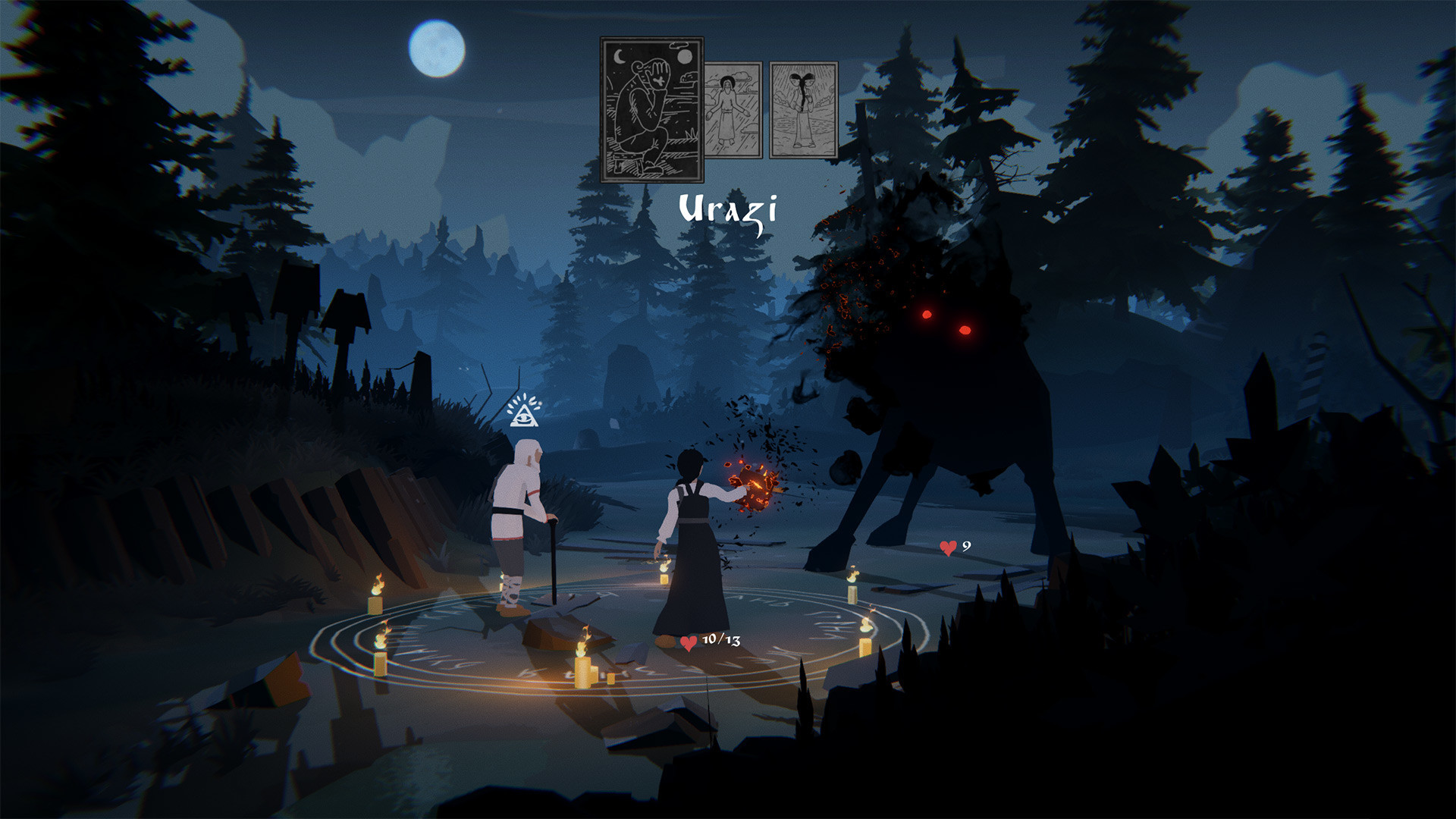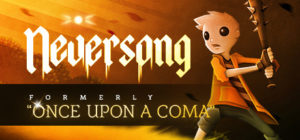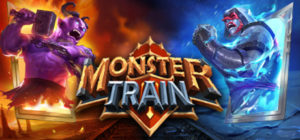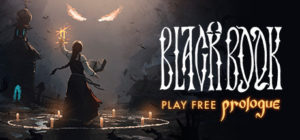The AA Report: May 26, 2020
Two in one day! Here are the first-take impressions of Neversong, Monster Train, and Black Book: Prologue.

Two AA Report posts in one day?! What!! Listen, I have videos to make, too. Those won’t get done until the end of the week, though, because I forgot to record the gameplay footage for both this week, and last week. That means I have to play at least a half an hour of all of these games, as well as the ones from last week. That means, yes, I have to play She Will Punish Them again. My fate is written. So shall it be.
Last night was a great lineup of games for Try it Tuesday. Here are the first-take impressions of those games: Neversong, Monster Train, and Black Book: Prologue.
Neversong
 Neversong is an adorably sad journey with a boy named Peet who went into a coma. Upon waking up, he learns his girlfriend is gone. Thus lays the groundwork for a story book tale for the ages: Peet must journey through towns and undergrounds, cemetaries and fields, to find the truth behind his coma, and the disappearance of his girlfriend. I was invited to check out this game a couple of years ago when it was in its very early stages; the game at the time was called Once Upon a Coma, and I recalled the early level I’d played as I trekked through the progress they made as Neversong. I was not disappointed. The perfect marriage of art and gameplay is found within this game, from its beautiful hand-drawn characters and landscapes, to its incredible piano soundtrack, to its voiceover work – this game is fully voiced! Yes! Neversong has a distinct Hollow Knight feel to it, which is definitely a high-tier compliment, and not a misplaced one. Both games have a striking visual style and audio counterpart to warrant comparison. Also, both games have a sprinkle of intangible magic to them that bares similarities beyond the obvious; dark themes, platforming, solid gameplay and thoughtful story – what you cannot place your finger on is definitely what gives Neversong the extra-special flavor fans of games like Hollow Knight or Ori and the Blind Forest might have an interest in. Combat isn’t as challenging as a game like Hollow Knight, but it does exist, sandwiched between bouts of puzzle solving and collectible hunting, all of which make sense with all the characters you’ll meet in the game, and the stories they’ll tell along the way. Neversong isn’t a very long game either, How Long To Beat clocks in the main story at around 4 hours, and that’s perfectly fine. There’s enough content within the game to keep your interest piqued for all of those hours and come out feeling like you got your moneys worth, and if that truly left you wanting more, you’re welcome and invited to check out Atmos’ other game, Pinstripe. Neversong is currently available on Steam.
Neversong is an adorably sad journey with a boy named Peet who went into a coma. Upon waking up, he learns his girlfriend is gone. Thus lays the groundwork for a story book tale for the ages: Peet must journey through towns and undergrounds, cemetaries and fields, to find the truth behind his coma, and the disappearance of his girlfriend. I was invited to check out this game a couple of years ago when it was in its very early stages; the game at the time was called Once Upon a Coma, and I recalled the early level I’d played as I trekked through the progress they made as Neversong. I was not disappointed. The perfect marriage of art and gameplay is found within this game, from its beautiful hand-drawn characters and landscapes, to its incredible piano soundtrack, to its voiceover work – this game is fully voiced! Yes! Neversong has a distinct Hollow Knight feel to it, which is definitely a high-tier compliment, and not a misplaced one. Both games have a striking visual style and audio counterpart to warrant comparison. Also, both games have a sprinkle of intangible magic to them that bares similarities beyond the obvious; dark themes, platforming, solid gameplay and thoughtful story – what you cannot place your finger on is definitely what gives Neversong the extra-special flavor fans of games like Hollow Knight or Ori and the Blind Forest might have an interest in. Combat isn’t as challenging as a game like Hollow Knight, but it does exist, sandwiched between bouts of puzzle solving and collectible hunting, all of which make sense with all the characters you’ll meet in the game, and the stories they’ll tell along the way. Neversong isn’t a very long game either, How Long To Beat clocks in the main story at around 4 hours, and that’s perfectly fine. There’s enough content within the game to keep your interest piqued for all of those hours and come out feeling like you got your moneys worth, and if that truly left you wanting more, you’re welcome and invited to check out Atmos’ other game, Pinstripe. Neversong is currently available on Steam.
Monster Train
 I deeply enjoy digital collectible card games, and deck builders, despite being pretty awful at them. Hearthstone really defined the visceral experience needed to set the standard; the movement of the cards, the sense of admiring both their abilities and the art on them, and the feeling of opening packs up – oh man, the feeling of opening packs. Other games have tried to duplicate it, and with the release of Magic: The Gathering Arena, the genre has really exploded. Spin-offs exist, and hence, he we are: games like Slay The Spire, Hand of Fate, Nowhere Prophet, and now Monster Train: A deck building roguelike set on a train. More or less, you’re the last savior of the fires of hell, and your job is to protect the final burning pyre within it from the forces of heaven. I feel like there have been a lot of games lately that put their players in the shoes of the monsters, the demons, and the forces of darkness, and I can’t say I’m mad about it – it gives a bit of antihero fun to the whole experience, and quite possibly makes you play differently then you would have, had you been a stalwhart champion of the people. I mean, I guess you can be a stalwhart champion of Hell, but the point being that you’re on what is traditionally billed as “evil” is not lost on me, and I am absolutely here for it. Monster Train brings to the caboose a bunch of strategy, quick thinking, and death: you’re going to lose your run eventually, and you have to accept that and keep going. Combat in the game takes place over a stacked train card of four levels, three of which you’ll place units and cast spells to as enemies of your evil empire ascend to try and snuff out the final pyre. Your pyre is essentially the life blood of your playthrough, and while it can take some damage and stop many enemies in its tracks, it can only take so much damage before you’re defeated entirely. But if you win, your train continues down the tracks, where you’ll have a chance to re-up on pyre health, buff up your party, or discover new artifacts that’ll strengthen your entire strategy going forward. For someone like me who isn’t particularly super skilled at deck builders, this game had a low point of entry to get its hooks in, and kept me engaged and entertained for the duration of my time with it. I didn’t make it far enough to unlock any new clans, so I was stuck with the two default ones you’re given at the start – the game, however, boasts five different monster clans that all have different and unique abilities. Another thing I’m unable to comment on outside of its existence is the multiplayer side of the game: Monster Train sports a mode called “Hell Rush”, essentially an eight player frenzy of pressure and intestinal fortitude, where speed counts and when the clock runs out, the player with the best quick strategy wins. Daily challenges were also abundant, which appear during single player campaign mode and allow for beefy rewards in exchange for beefy risks. I eyeballed a few, but I felt my confidence shrink in the face of them, or I should say… in the face of my depleting pyre health. Monster Train is likely a title I’ll return to at some point, because it had an addictive loop. At the very least, I’ll have my eyes peeled on Monster Train‘s future, and whether or not they’ll evolve and grow into something even better then what it already is. Monster Train is currently available only on Steam.
I deeply enjoy digital collectible card games, and deck builders, despite being pretty awful at them. Hearthstone really defined the visceral experience needed to set the standard; the movement of the cards, the sense of admiring both their abilities and the art on them, and the feeling of opening packs up – oh man, the feeling of opening packs. Other games have tried to duplicate it, and with the release of Magic: The Gathering Arena, the genre has really exploded. Spin-offs exist, and hence, he we are: games like Slay The Spire, Hand of Fate, Nowhere Prophet, and now Monster Train: A deck building roguelike set on a train. More or less, you’re the last savior of the fires of hell, and your job is to protect the final burning pyre within it from the forces of heaven. I feel like there have been a lot of games lately that put their players in the shoes of the monsters, the demons, and the forces of darkness, and I can’t say I’m mad about it – it gives a bit of antihero fun to the whole experience, and quite possibly makes you play differently then you would have, had you been a stalwhart champion of the people. I mean, I guess you can be a stalwhart champion of Hell, but the point being that you’re on what is traditionally billed as “evil” is not lost on me, and I am absolutely here for it. Monster Train brings to the caboose a bunch of strategy, quick thinking, and death: you’re going to lose your run eventually, and you have to accept that and keep going. Combat in the game takes place over a stacked train card of four levels, three of which you’ll place units and cast spells to as enemies of your evil empire ascend to try and snuff out the final pyre. Your pyre is essentially the life blood of your playthrough, and while it can take some damage and stop many enemies in its tracks, it can only take so much damage before you’re defeated entirely. But if you win, your train continues down the tracks, where you’ll have a chance to re-up on pyre health, buff up your party, or discover new artifacts that’ll strengthen your entire strategy going forward. For someone like me who isn’t particularly super skilled at deck builders, this game had a low point of entry to get its hooks in, and kept me engaged and entertained for the duration of my time with it. I didn’t make it far enough to unlock any new clans, so I was stuck with the two default ones you’re given at the start – the game, however, boasts five different monster clans that all have different and unique abilities. Another thing I’m unable to comment on outside of its existence is the multiplayer side of the game: Monster Train sports a mode called “Hell Rush”, essentially an eight player frenzy of pressure and intestinal fortitude, where speed counts and when the clock runs out, the player with the best quick strategy wins. Daily challenges were also abundant, which appear during single player campaign mode and allow for beefy rewards in exchange for beefy risks. I eyeballed a few, but I felt my confidence shrink in the face of them, or I should say… in the face of my depleting pyre health. Monster Train is likely a title I’ll return to at some point, because it had an addictive loop. At the very least, I’ll have my eyes peeled on Monster Train‘s future, and whether or not they’ll evolve and grow into something even better then what it already is. Monster Train is currently available only on Steam.
Black Book: Prologue
 Black Book has the appearance of a strong narrative titles like The Banner Saga, Ken Follett’s The Pillars of the Earth, or Ash of Gods: Redemption. To go into it and expect a game of similar style wouldn’t be inaccurate, either: Black Book takes influence from Slavic mythology to play out the story of a young sorceress who gave up her life to search for answers surrounding the mysterious death of her husband. The black book of the title is a demonic artifact that, as the game describes, is “said to be powerful enough to grant any wish to the one who uncovers all 7 of its seals.” Thus begins your tale: you set forth to help the people of your village with problems, while at the same time searching for information about the seals, and battling demons along the way. For the purposes of review, I played a free demo of this game available on Steam called Black Book: Prologue, a small slice of a larger game that is set for release in early 2021. Dialogue in the game had a unique presence, and at some points you’re met with having to solve verbal “puzzles” with the people you interact with. These puzzles are usually ones that require you to consult a lore book of sorts, within the game, to answer correctly and gain wisdom points for doing so. You also explore a map, searching for resources and …well, demons that you’ll fight with a spellbook. The book and these fights are your main combat loop, and it plays out like a deck builder. You’ll gain different spells and abilities as you progress through these fights, so it appears as though exploring the map to find these encounters is a big part of the game experience, and worth doing. I loved that, rather than presenting them merely as cards, they were pages within a spellbook, and that after selecting your spells, the character would come to life with witch powers and throw it all at some demon in front of her. This concept is amazing, and it fits the setting and the graphics. There was something that felt like it could be firmed up within this combat and some of the graphics, but as I talked this out with my chat during the live stream, we couldn’t quite put our finger on it. Refining animations in the combat sequence, possibly? Adding some bold lines to the art style of the game’s exploratory sequences? I’m not sure, and I think it’s sometimes a bit bold to suggest things like this, as if it is as easy as pie to just change the groundwork of the game as it currently exists. I honestly have next to no complaints about Black Book: Prologue, outside of possibly making those spells pop a little more – I’ll still be playing it on release, because the proof of concept left me wanting more. And, because I’m a fan of weird, spooky things, and games with strong stories, Black Book: Prologue hit all of the notes for me. It’s something I’ve already wishlisted on Steam, and will likely Kickstart before the end of the week. A deep narrative game with a hook like this will always have my vote of confidence, so I’m excited to see what the future of Black Book has to offer. Currently, you can check out Black Book: Prologue on Steam for free, and wishlist the full game for its to-be-determined 2021 release date.
Black Book has the appearance of a strong narrative titles like The Banner Saga, Ken Follett’s The Pillars of the Earth, or Ash of Gods: Redemption. To go into it and expect a game of similar style wouldn’t be inaccurate, either: Black Book takes influence from Slavic mythology to play out the story of a young sorceress who gave up her life to search for answers surrounding the mysterious death of her husband. The black book of the title is a demonic artifact that, as the game describes, is “said to be powerful enough to grant any wish to the one who uncovers all 7 of its seals.” Thus begins your tale: you set forth to help the people of your village with problems, while at the same time searching for information about the seals, and battling demons along the way. For the purposes of review, I played a free demo of this game available on Steam called Black Book: Prologue, a small slice of a larger game that is set for release in early 2021. Dialogue in the game had a unique presence, and at some points you’re met with having to solve verbal “puzzles” with the people you interact with. These puzzles are usually ones that require you to consult a lore book of sorts, within the game, to answer correctly and gain wisdom points for doing so. You also explore a map, searching for resources and …well, demons that you’ll fight with a spellbook. The book and these fights are your main combat loop, and it plays out like a deck builder. You’ll gain different spells and abilities as you progress through these fights, so it appears as though exploring the map to find these encounters is a big part of the game experience, and worth doing. I loved that, rather than presenting them merely as cards, they were pages within a spellbook, and that after selecting your spells, the character would come to life with witch powers and throw it all at some demon in front of her. This concept is amazing, and it fits the setting and the graphics. There was something that felt like it could be firmed up within this combat and some of the graphics, but as I talked this out with my chat during the live stream, we couldn’t quite put our finger on it. Refining animations in the combat sequence, possibly? Adding some bold lines to the art style of the game’s exploratory sequences? I’m not sure, and I think it’s sometimes a bit bold to suggest things like this, as if it is as easy as pie to just change the groundwork of the game as it currently exists. I honestly have next to no complaints about Black Book: Prologue, outside of possibly making those spells pop a little more – I’ll still be playing it on release, because the proof of concept left me wanting more. And, because I’m a fan of weird, spooky things, and games with strong stories, Black Book: Prologue hit all of the notes for me. It’s something I’ve already wishlisted on Steam, and will likely Kickstart before the end of the week. A deep narrative game with a hook like this will always have my vote of confidence, so I’m excited to see what the future of Black Book has to offer. Currently, you can check out Black Book: Prologue on Steam for free, and wishlist the full game for its to-be-determined 2021 release date.
